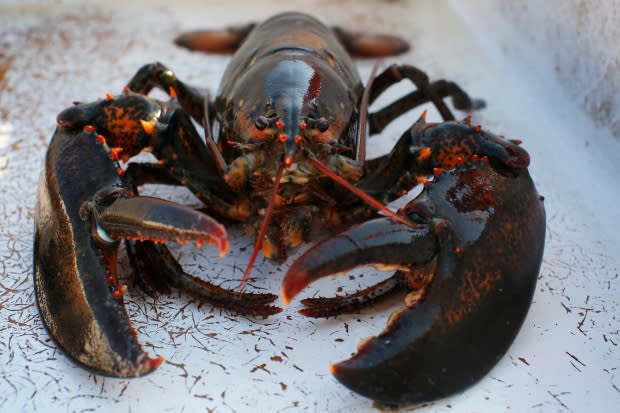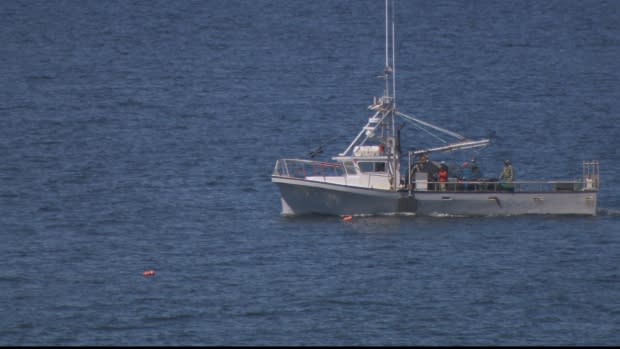Five U.S. nationals arrested, fined for fishing in Passamaquoddy Bay
A U.S. Passamaquoddy fisherman says he doesn't go out of his way to fish lobster in Canadian waters. But the border is just a mile away from his reserve in Maine and he can't earn a living if he doesn't cross it now and then.
"We're literally going from our back doors to where our people have fished and survived for thousands of years," said Adam Newell, who lives on the Sipayik reservation in Pleasant Point.
On Dec. 6, five U.S. fishermen, including four from the Passamaquoddy tribe, were arrested on the Canadian side of the border.
The next day, they pleaded guilty to trapping lobster illegally in Canada, shedding light on cross-country dissent in lobster-rich Passamaquoddy Bay.
I don't see it as Canadian waters or American waters, I see it as a bay that my ancestors have been fishing in for 10,000 plus year. - Adam Newell, U.S. Passamaquoddy fisherman.
Canadian law prohibits foreign nationals from commercial fishing in Canadian waters, but some Passamaquoddy Indigenous people believe they have the right to fish on either side, because their traditional territory spans both countries.
"I don't see it as Canadian waters or American waters, I see it as a bay that my ancestors have been fishing in for 10,000-plus years. And why stop fishing and utilizing the resources of that bay because of a new governmental system?"
Not recognized
The Passamaquoddy on the New Brunswick side identify by their traditional name Peskotomuhkati. They've been negotiating with the federal government to be recognized as a First Nation, which would allow them to have all the fishing rights associated with being an Indigenous nation in Canada.
Peskotomuhkati Chief Hugh Akagi declined an interview with CBC News but has previously said that all Indigenous people across borders share rights. There are only about 500 Peskotomuhkati in Canada, and more than 3,000 Passamaquoddy in the U.S.
Akagi said traditional rights are important but he suggested they don't trump respecting conservation and fellow fishermen, even if not Indigenous.
"Local fishers are our neighbours," Akagi previously told CBC.

Newell said even though people can fish for lobster year-round in Maine, he follows Canadian fishing seasons.
"I don't want to have conflict with Canadian fishermen, that's why we stop fishing so early," he said.
He said an ideal situation would be to allow U.S. Passamaquoddy to have a limited fishery along with their New Brunswick counterparts.
Not the only ones
The five arrested this month are just the tip of the iceberg, said Lillian Mitchell of the Fundy North Fishermen's Association, because it's common for U.S. fishermen to cross the line into Canadian water. Most stay undetected because of limited enforcement resources.
"In a lot of cases you have illegal activities like this and there's not much recourse or I guess expectation that there's going to be enforcement," she said. "And fishermen on the U.S. side of the border know this and it kind of enables them to really continue with that illegal activity."

She said in this particular case, the five fishermen were fishing commercially, and they were warned a few times before being arrested.
Department of Fisheries and Oceans spokesperson Debbie Buott-Matheson said the vessel carrying five people was boarded by fisheries officers off Deer Island. RCMP were called and the fishermen were held in St. George before being taken to court.
They were each fined $500 to $3,500 for violating the Coastal Fisheries Protection Act. Their catch, equipment and vessel were seized and will be returned when they pay the fines.
Two weeks later, the vessel was still sitting at a DFO holding facility, Buott-Matheson said.
Buott-Matheson could not say how often these types of arrests happen, and she declined to comment on the tribal connection.
Mitchell said some Canadian-side people in Passamaquoddy Bay are frustrated by the competition U.S. fishermen pose.
"Tension around fishing has always been an issue," she said. "There's always people who like to push that boundary, but as far as conflict on the water goes, we work very very hard to make sure that nothing ever gets to that point.
"And that's part of why DFO's role is so important because we can't have people just breaking the law."
The negotiations between DFO and the Peskotomuhkati are continuing, and it may take months or years to reach a resolution, said Mitchell.

